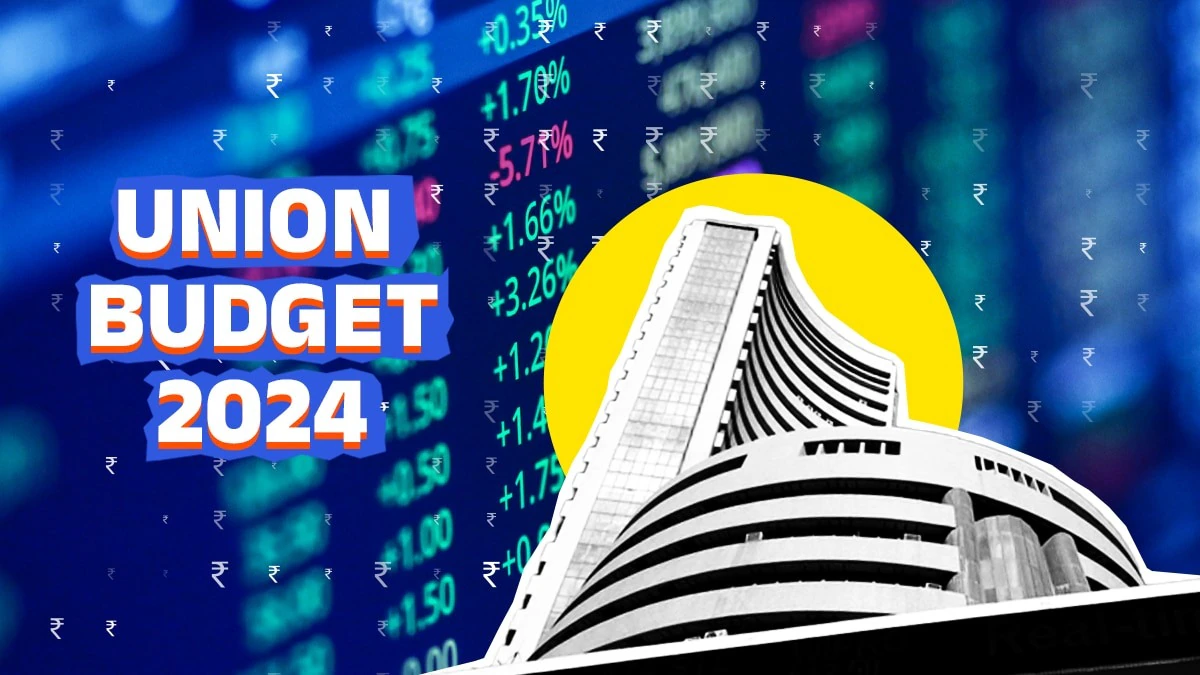Impact of the Union Budget 2024 on the Stock Market: Key Highlights

The Union Budget presented by Finance Minister Nirmala Sitharaman has brought significant changes that are expected to impact various sectors of the stock market. Here’s a detailed summary of the key announcements and their potential impact:
Table of contents
- 1. Reduction in Customs Duty on Gold, Silver, and Electronics
- 2. Increase in Securities Transaction Tax (STT)
- 3. Simplification of Capital Gains Taxation
- 4. Abolition of Angel Tax for Investors
- 5. Exemption on Medicines for Cancer Patients
- 6. Revisions in New Tax Regime
- 7. Emphasis on Expanding the Space Economy
- 8. Fiscal Deficit and Infrastructure Investments
- 9. Land-Related and Labour Reforms
- 10. Decriminalisation of TDS Payment Delays
- 11. Promotion of Private Investment in Infrastructure
- 12. Advancements in Energy and Power Sector
- 13. Rooftop Solar Scheme
- 14. Enhanced Mudra Loans
- Cheaper and Costlier Items
- Conclusion
1. Reduction in Customs Duty on Gold, Silver, and Electronics
Details: The customs duty on gold and silver has been reduced to 6%, and on platinum to 6.4%. Additionally, the duty on mobile phones and chargers has been reduced to 15%.
Impact: This reduction is likely to benefit jewelry and electronics companies by lowering their import costs, potentially leading to increased profitability. Stocks of companies in these sectors may see a positive impact as a result.
2. Increase in Securities Transaction Tax (STT)
Details: The STT on Futures and Options contracts has been increased to 0.2% and 0.1% respectively. Income from buyback of shares will now be taxed in the hands of the recipient.
Impact: Higher STT might dampen trading volumes in the derivatives market, potentially affecting brokerage firms and high-frequency trading companies.
Negative for traders and pro trading floor because cost of transaction will increase. The taxation on buybacks could lead to a shift in corporate strategies regarding capital returns.
3. Simplification of Capital Gains Taxation
Details: Short-term gains on certain financial assets will now be taxed at 20% from 15% pervious . The exemption limit for capital gains on some financial instruments has been increased to ₹1.25 lakh per year.
Impact: Simplification and increase in exemption limits could encourage more investments in financial assets, benefiting financial services and asset management companies. But its negative for short term trader, it will impact their earning, margin and profit.
4. Abolition of Angel Tax for Investors
Details: The so-called Angel Tax for all classes of investors has been abolished to support the startup ecosystem.
Impact: This move is expected to boost investments in startups and small companies potentially leading to a surge in innovation and growth in the technology sector. Stocks of companies in this ecosystem may see increased investor interest.
5. Exemption on Medicines for Cancer Patients
Details: Three additional medicines for cancer patients have been fully exempted from customs duty.
Impact: This will reduce the cost of treatment for cancer patients and could positively impact pharmaceutical companies involved in the production and distribution of these medicines.
6. Revisions in New Tax Regime
Details: The new tax regime includes a revised tax rate structure, with savings up to ₹17,500 a year for salaried employees.
· Up to Rs 3 lakh – 0%
· Rs 3 lakh to Rs 7 lakh – 5%
· Rs 7 lakh to Rs 10 lakh – 10%
· Rs 10 to Rs 12 lakh – 15%
· Rs 12 to Rs 15 lakh – 20% · Above Rs 15 lakh – 30%
Impact: Increased disposable income for salaried individuals could boost consumer spending, benefiting sectors like retail, FMCG, and automobiles.
7. Emphasis on Expanding the Space Economy
Details: A ₹1,000 crore venture capital fund will be set up to expand the space economy by five times over the next decade.
Impact: This initiative could drive growth in the aerospace sector, leading to potential stock market gains for companies involved in space technologies and related industries. But its very small amount for this sector.
8. Fiscal Deficit and Infrastructure Investments
Details: The fiscal deficit is estimated at 4.9% of GDP. Significant investments in infrastructure will continue, with ₹11,11,111 crore allocated for capex.
Impact: Continued focus on infrastructure development could have a multiplier effect on the economy, benefiting construction, cement, and steel sectors.
9. Land-Related and Labour Reforms
Details: Reforms in land administration and urban planning, along with labour-related reforms, will be undertaken.
Impact: These reforms aim to improve the ease of doing business, potentially attracting more investments and positively impacting the real estate and industrial sectors.
10. Decriminalisation of TDS Payment Delays
Details: TDS rate on e-commerce operators is reduced from 1% to 0.1%, and delays in TDS payments up to the filing due date are decriminalized.
Impact: This will ease the compliance burden on businesses, especially in the e-commerce sector, potentially boosting their profitability and attractiveness to investors. Good for E- Commerce company
11. Promotion of Private Investment in Infrastructure
Details: Private investment in infrastructure will be promoted through Viability Gap Funding and a market-based financing framework.
Impact: This initiative is expected to catalyze infrastructure development, benefiting companies in construction, engineering, and related industries.
12. Advancements in Energy and Power Sector
Details: Focus on renewable energy, development of smaller nuclear reactors, and setting up Advanced Ultra-Super Critical Thermal Power Plants.
Impact: These advancements could drive growth in the energy sector, benefiting companies involved in renewable energy and advanced power technologies.
13. Rooftop Solar Scheme
Details: A Rooftop Solar scheme has been launched to enable 1 crore households to receive up to 300 units of free electricity per month.
Impact: This scheme could spur growth in the renewable energy sector, particularly in solar energy companies.
14. Enhanced Mudra Loans
Details: The Mudra loan limit will be enhanced to ₹20 lakh, and a credit guarantee scheme for MSMEs will be introduced.
Impact: Enhanced credit access for MSMEs could stimulate growth in this sector, potentially benefiting financial institutions and MSME-focused companies.
Cheaper and Costlier Items
Cheaper: Cancer drugs, mobile phones, chargers, solar equipment, leather goods, footwear, textiles, and gold, silver, platinum making charges.
Costlier: PVC flex banners, imported telecom equipment, and ammonium nitrate.
Conclusion
The Union Budget presents a mix of policy changes and incentives aimed at various sectors. For short term market will not like this because its not in the favour of trader but in favour of long term investors. Market may go down for approximate 5% down but it will correct after this. Market never like budget, history is live example of this, mostly time market give negative reaction because of high exception.
While the reduction in customs duties and abolition of Angel Tax are expected to have positive effects, the increase in STT and changes in capital gains taxation will need careful consideration by investors. Overall, the budget’s emphasis on infrastructure, energy, and startup ecosystem is likely to drive long-term growth and stability in the stock market.
Also Read: How to be a Mutual Fund Agent in India: Your Path to Financial Advisory Success



